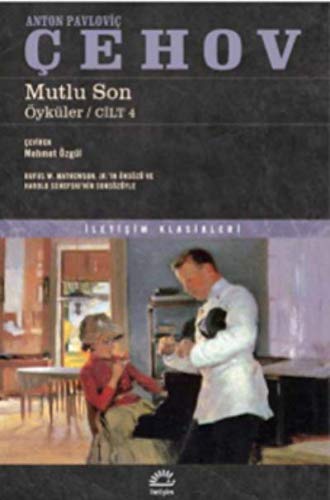
Part of Series
Öykücülüğün ustası Çehov’un dönemin atmosferine ve gündelik hayatın ayrıntılarına ışık tutan öykülerini derleyen bir şaheser. Kimliğini Saklayan Adamın Öyküsü Çehov’un 1893-1895 yılları arasında Russkaya Mıysıl, Russkiye Vedomosti ve Novoye Vremya dergilerine yazdığı öykülerden oluşuyor. Bu ciltte, Çehov’un kariyerinde bir dönüm noktası olan ve Rus edebiyatının parlayan yıldızı olarak eleştirmenlerin dikkatini çeken “Kadınların Kendi Dünyası” gibi kısa öykülerinin yanı sıra dönemin siyasi gerilimlerine değindiği “Kimliğini Saklayan Adamın Öyküsü” ve Moskova hayatını tüm çarpıcılığıyla gözler önüne serdiği “Üç Yıl” gibi uzun öyküleri de yer alıyor. “Genç bir adamken beni hangi yazarlar mı etkiledi? Çehov! Oyun yazarı olarak? Çehov! Öykü yazarı olarak? Çehov!” Tennessee Williams
Authors

Anton Pavlovich Chekhov (Russian: Антон Павлович Чехов ) was born in the small seaport of Taganrog, southern Russia, the son of a grocer. Chekhov's grandfather was a serf, who had bought his own freedom and that of his three sons in 1841. He also taught himself to read and write. Yevgenia Morozova, Chekhov's mother, was the daughter of a cloth merchant. "When I think back on my childhood," Chekhov recalled, "it all seems quite gloomy to me." His early years were shadowed by his father's tyranny, religious fanaticism, and long nights in the store, which was open from five in the morning till midnight. He attended a school for Greek boys in Taganrog (1867-68) and Taganrog grammar school (1868-79). The family was forced to move to Moscow following his father's bankruptcy. At the age of 16, Chekhov became independent and remained for some time alone in his native town, supporting himself through private tutoring. In 1879 Chekhov entered the Moscow University Medical School. While in the school, he began to publish hundreds of comic short stories to support himself and his mother, sisters and brothers. His publisher at this period was Nicholas Leikin, owner of the St. Petersburg journal Oskolki (splinters). His subjects were silly social situations, marital problems, farcical encounters between husbands, wives, mistresses, and lovers, whims of young women, of whom Chekhov had not much knowledge – the author was shy with women even after his marriage. His works appeared in St. Petersburg daily papers, Peterburskaia gazeta from 1885, and Novoe vremia from 1886. Chekhov's first novel, Nenunzhaya pobeda (1882), set in Hungary, parodied the novels of the popular Hungarian writer Mór Jókai. As a politician Jókai was also mocked for his ideological optimism. By 1886 Chekhov had gained a wide fame as a writer. His second full-length novel, The Shooting Party, was translated into English in 1926. Agatha Christie used its characters and atmosphere in her mystery novel The Murder of Roger Ackroyd (1926). Chekhov graduated in 1884, and practiced medicine until 1892. In 1886 Chekhov met H.S. Suvorin, who invited him to become a regular contributor for the St. Petersburg daily Novoe vremya. His friendship with Suvorin ended in 1898 because of his objections to the anti-Dreyfus campaign conducted by paper. But during these years Chechov developed his concept of the dispassionate, non-judgmental author. He outlined his program in a letter to his brother Aleksandr: "1. Absence of lengthy verbiage of political-social-economic nature; 2. total objectivity; 3. truthful descriptions of persons and objects; 4. extreme brevity; 5. audacity and originality; flee the stereotype; 6. compassion." Chekhov's first book of stories (1886) was a success, and gradually he became a full-time writer. The author's refusal to join the ranks of social critics arose the wrath of liberal and radical intelligentsia and he was criticized for dealing with serious social and moral questions, but avoiding giving answers. However, he was defended by such leading writers as Leo Tolstoy and Nikolai Leskov. "I'm not a liberal, or a conservative, or a gradualist, or a monk, or an indifferentist. I should like to be a free artist and that's all..." Chekhov said in 1888. The failure of his play The Wood Demon (1889) and problems with his novel made Chekhov to withdraw from literature for a period. In 1890 he travelled across Siberia to remote prison island, Sakhalin. There he conducted a detailed census of some 10,000 convicts and settlers condemned to live their lives on that harsh island. Chekhov hoped to use the results of his research for his doctoral dissertation. It is probable that hard conditions on the island also weakened his own physical condition. From this journey was born his famous travel book T
Mehmet Özgül 1936 yılında Nevşehir, Avanos’ta doğmuştur. Lise eğitimini Kuleli Askeri Lisesi’nde aldıktan sonra, Ankara Üniversitesi Dil ve Tarih-Coğrafya Fakültesi, Rus Dili ve Edebiyatı bölümünden 1959 yılında mezun olmuştur. Sonraki yıllarda Gazi Eğitim Enstitüsü’nde, İngiliz Dili ve Edebiyatı eğitimi almıştır. Yüksek lisansını 1969 yılında Amerika Georgetown Üniversitesi'nde uygulamalı dil bilimi dalında yapmıştır. 1963-67 yılları arasında Genelkurmay Başkanlığı’nda Rusça çevirmen olarak çalışmıştır. Kariyerinde belirli dönemlerde Rusça ve İngilizce öğretmenliği yapmıştır. 1979 yılında askeriyeden albay olarak emekli olmuştur. İlk olarak 1960 yılında Varlık Yayınları için Çehov çevirisi yapmıştır. Emekli olduktan sonra bu alanda yoğunlaşmıştır. 1998 yılında Çehov’un bütün öykülerinin, 2006'da bütün oyunlarının Türkçeye çevirisini tamamlamıştır. Özgül'e, 1981 yılında, Türkiye Yazarlar Sendikası tarafından Hasan Ali Ediz Çeviri Ödülü verilmiştir. Ödül Türkiye'nin tek çeviri bilimi ödülü olmakla birlikte sadece iki kişiye verilmiştir. 1984 ve 1987 yıllarında Rus Yazarlar Birliği'nin davetlisi olarak Uluslararası Çevirmenler Konferansına katılmıştır. Ayrıca Mehmet Özgül Çevbir Haysiyet Kurulu’na başkanlık yapmaktadır. Mehmet Özgül, Çehov, Tolstoy, Dostoyevski, Gogol gibi klasik Rus edebiyatı çevirileri yanı sıra, İlya Ehrenburg, Konstantin Simonov, Yevgeni Yevtuşenko, Cengiz Aytmatov, Fazıl İskender, İlya İlf, Yuri Buyda, Yevgeni Petrof veLyudmilla Ulitskaya gibi çağdaş Sovyet dönemi ve Rus yazarlarından yaptığı elliye yakın çevirilerle tanınmaktadır. Usta çevirmen Özgül, ayrıca yazar olarak bir de kitap çıkarmıştır.
Turkish variant spelling record for Anton Chekhov See also: Anton Pavlovič Čechov, Anton Pavlovici Cecov, Anton Chekhov

